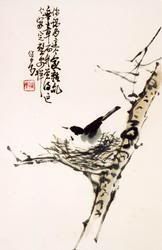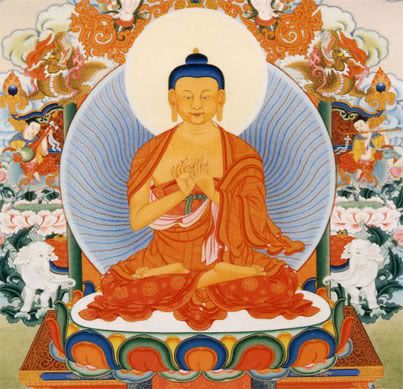
Japanese Buddhist Haiku Poems
Issa (1763-1827)
Ah, sacred swallow -
twittering out from your nest
in great Buddha's nostril!
My old father also
looked long on these white mountains
through lonely winters....
This dewdrop world:
it may be a dewdrop.
and yet, and yet...
Buson (1716 - 1783)
Lighting one candle
with another candle -
Spring evening.
Around the small house
struck by lightning,
melon flowers.
They end their flight
one by one -
crows at dusk.
Butterfly
sleeping
on the temple bell.
The camelia -
it fell into the darkness
of the old well.
Basho (1644 - 1694)
Still old pond,
frog jumps in,
Plop!
The dragonfly
can't quite land
on that blade of grass.
The sadness of it....
Under the hero's helmet,
tarnished now, a cricket.
Cicada shell:
it sang itself
utterly away.
A bee
staggers out
of a peony.
A crow
settles on a bare branch -
Autumn evening.
_________________
Basho's Notes On Poetry Writing
Learn about pines from the pine, and about bamboo from the bamboo...
The secret of poetry lies in treading the middle way between the reality of the world and the emptiness of the world....
First, one must concentrate the mind fully on an object. Once your mind attains unbroken concentration on the object, the space between yourself and the object disappears. Then the essential nature of the object is perceived. But you must express it immediately. If you begin to think about it, it will vanish from the mind.
Composition must occur in an instant, like a swordsman leaping at his enemy, or like slicing a ripe watermelon with a sharp knife.
_______________________________
Chinese Buddhist Poetry
As for me, I delight in the everyday Way,
Among mist-wrapped vines and rocky caves.
Here in the wilderness I am completely free,
With my friends, the white clouds, idling forever.
There are roads, but they do not reach the world;
Since I am mindless, who can rouse my thoughts?
On a bed of stone I sit, alone in the night,
While the round moon climbs up Cold Mountain.
Han Shan, 'Cold Mountain Poems' (showing the profound influence of Laotsu and Taoism on the Chinese Buddhists)
_____________________
BUDDHIST SCRIPTURES

Metta Sutta (Sutta Nipata I.8)
The Buddha's Meditation on Loving-Kindness
What should be done by one who's skilled in wholesomeness
To gain the state of peacefulness is this:
One must be able, upright, straight and not proud,
Easy to speak to, mild and well content,
Easily satisfied
And not caught up in too much bustle,
And frugal in one's ways,
With senses calmed, intelligent, not bold,
Not being covetous when with other folk,
Abstaining from the ways that wise ones blame,
This mindfulness one should always hold:
"May beings be happy and safe.
May their hearts rejoice within themselves.
Whatever may breathe the breath of life,
Whether they be frail or strong, visible, or invisible,
Whether they dwell far or near,
Those who are here, those who have departed,
Or those seeking to be born in this world,
May all beings rejoice within themselves.
Let no one bring ruin to another.
Let none despise another in any way or place.
Let them not wish each other any ill."
Just as a mother would risk her life
To love and protect her child, her only child,
So one should cultivate this boundless love (Metta)
For all who live in the universe,
Extending sublime consciousness of compassion
Upward, downward, and across the world,
Untroubled, free from hatred and from craving.
Peace, Peace, Peace.
And while one stands and while one walks and sits
Or one lies down still free from drowsiness
One should be intent on this mindfulness
This is divine abiding here they say.
And when one lives quite free from any view,
In virtue, with perfect insight won,
And greed for sensual desires expelled,
One surely comes no more to any womb.
______________________________
Heart Sutra (Prajna Paramitta Sutra)
When the Bodhisattva
Was practicing Deep Prajnaparamita of Wisdom
Perceived the five skandhas
He saw them to be, in their own self-nature,
Utterly empty;
And He Was delivered from all suffering and misery.
He said:
Was practicing Deep Prajnaparamita of Wisdom
Perceived the five skandhas
He saw them to be, in their own self-nature,
Utterly empty;
And He Was delivered from all suffering and misery.
He said:
"Oh Sariputra, Form is emptiness, Emptiness is form.
Form is the same as emptiness, Emptiness is the same as form.
That which is formed is empty, that which is empty has form
So it is also with sensation and thought and activity and consciousness.
Form is the same as emptiness, Emptiness is the same as form.
That which is formed is empty, that which is empty has form
So it is also with sensation and thought and activity and consciousness.
Oh Sariputra! All things are empty:
They are not born, They are not annihilated.
They are not impure, They are not pure.
They do not increase, They do not decrease.
They are not born, They are not annihilated.
They are not impure, They are not pure.
They do not increase, They do not decrease.
Therefore, Oh Sariputra:
In emptiness there is no form, no sensation, no thought, No activity, No consciousness.
No eye, nor nose, nor tongue, Nor body, nor mind.
No form, nor sound, nor color, nor taste, nor touch, nor objects.
No element of hearing. No element of vision, no element of smelling,
No element of tasting, no element of touching, No element of consciousness.
There is no knowledge and no ignorance.... No old age and No death,
And no extinction of old age and death.
In emptiness there is no form, no sensation, no thought, No activity, No consciousness.
No eye, nor nose, nor tongue, Nor body, nor mind.
No form, nor sound, nor color, nor taste, nor touch, nor objects.
No element of hearing. No element of vision, no element of smelling,
No element of tasting, no element of touching, No element of consciousness.
There is no knowledge and no ignorance.... No old age and No death,
And no extinction of old age and death.
There is no suffering, No accumulation, no annihilation,
No Path!
No Path!
There is no Knowledge, no attainment and no realization!
Because there is no Attainment in the mind of the Bodhisattva,
There are no obstacles.
Going beyond all views, beliefs and opinion, He is Nirvana!
There are no obstacles.
Going beyond all views, beliefs and opinion, He is Nirvana!
All Buddhas of the Past, Present and Future depend on this Prajna Paramita
To attain the Highest Perfect Enlightenment.
Therefore know that Prajna Paramita is a Great Spiritual Mantra,
Great Bright Mantra, Supreme Mantra, aUnequaled Mantra.
It removes all suffering; it is genuine and not false.
That is why the Prajna Paramita Mantra was spoken. Recite it like this:
To attain the Highest Perfect Enlightenment.
Therefore know that Prajna Paramita is a Great Spiritual Mantra,
Great Bright Mantra, Supreme Mantra, aUnequaled Mantra.
It removes all suffering; it is genuine and not false.
That is why the Prajna Paramita Mantra was spoken. Recite it like this:
Gaté Gaté Paragaté Parasamgaté: Bodhi Svaha!
("Gone, Gone, Gone Beyond, Gone Beyond Beyond: Hail the Goer!")
__________________________
Taking Refuge in the Three Jewels
(This fundamental practice is chanted every morning).
I take refuge in the Buddha. May I absorb myself in the living source of understanding, faith and compassion, awaken to the boundless Pure Land
I take refuge in the Dharma. May I be submerged in the depths of the Teachings, in the revelation of the Present Moment, gaining wisdom as deep as the ocean. (bell & bow)
I take refuge in the Sangha. May I live in harmony with this community, and in harmony with all beings,
in the spirit of universal compassion, the spirit of unity, freed from the bondage of selfishness. (bell & bow)
____________________________________________
Every Buddhist lay-person must follow the Five Precepts. Buddhist monks and monks must add to these another five, making the '10 Commandments' of Buddhism.
Five Precepts
* No sexual impurity (sexual intimacy only in marriage)
* No lying
* No stealing
* No killing (violence can be used only in self-defense)
* No intoxicants
Five Additional Precepts for Monks and Nuns
* No gossip or malicious speech
* No self-display (jewelry, luxurious clothes or sensual behavior)
* No eating after noon (fasting)
* No defaming of the Three Jewels**
* No accepting of money
from Hakuin's 'SONG OF ZAZEN'
Hakuin was the Medieval Japanese founder of the Rinzai school of Zen Buddhism in Japan. He was also a great poet and artist of Sumi-e ink paintings.
"All sentient beings are essentially Buddhas.
There is no ice without water:
Apart from sentient beings, there are no Buddhas.
Not knowing how close the truth is, we seek it - what a pity!
We are like one who, bathing in a fresh mountain stream, cries out in thirst.
All moral duties come down to just being here.
How vast and wide the unobstructed sky of the heart!
How bright and clear the perfect moonlight of wisdom!
In this moment, what more need we seek?
Here, in the eternal tranquility of Truth,
this very place is the Land of Lotuses;
This very body is the body of the Buddha.
____________________
-->
Tibetan Buddhism, from the Hymn to 21 Forms of Tara
Tara is the "Mother of Buddha," said to be the feminine form of Avalokit-Ishwara, whose worship also inspired the worship of Kwan Yin in China, Kannon in Japan.
Homage to you, Tara, whose radiant crown ornament,
Joyful and magnificent, extends a garland of light,
And who, by your laughter of TUTTARA,
Conquer the dark forces of all worlds.
Homage to you, Tara, who are able to invoke
The entire assembly of local devas and protectors,
Whose awe-full countenance fiercely shakes,
Rescuing the impoverished through the letter HUM.
Homage to you, Tara, whose crown is adorned
With the crescent moon and ornaments exceeding bright;
From your hair knot the Buddha Amitabha
Radiates eternally with great beams of light.
Homage to you, Tara, who dwell within a blazing garland
That resembles the fire at the end of this world age;
Surrounded by joy, you sit with right leg extended
And left withdrawn, uncreating all enemies and delusions.
Homage to you, Tara, with hand on the ground by your side,
Pressing your heel and stamping your foot on the earth;
With a penetrating glance from your eyes you awaken
All seven worlds within us through the syllable HUM.
Homage to you, Tara, O happy virtuous peaceful one,
The very object of meditation, transcending sorrow.
You are endowed with the mantra SOHAM,
Overcoming completely all obstacles to our perfect joy.




























































































